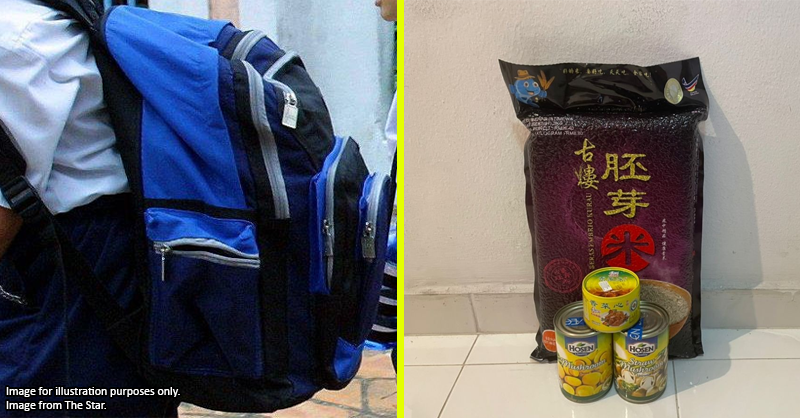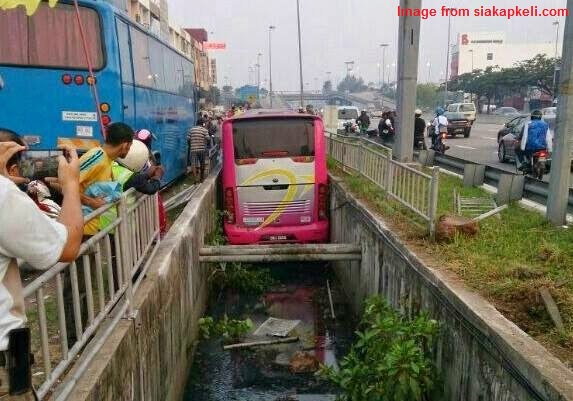Will Malaysia be short of rice if farmers don’t plant padi on time? We find out
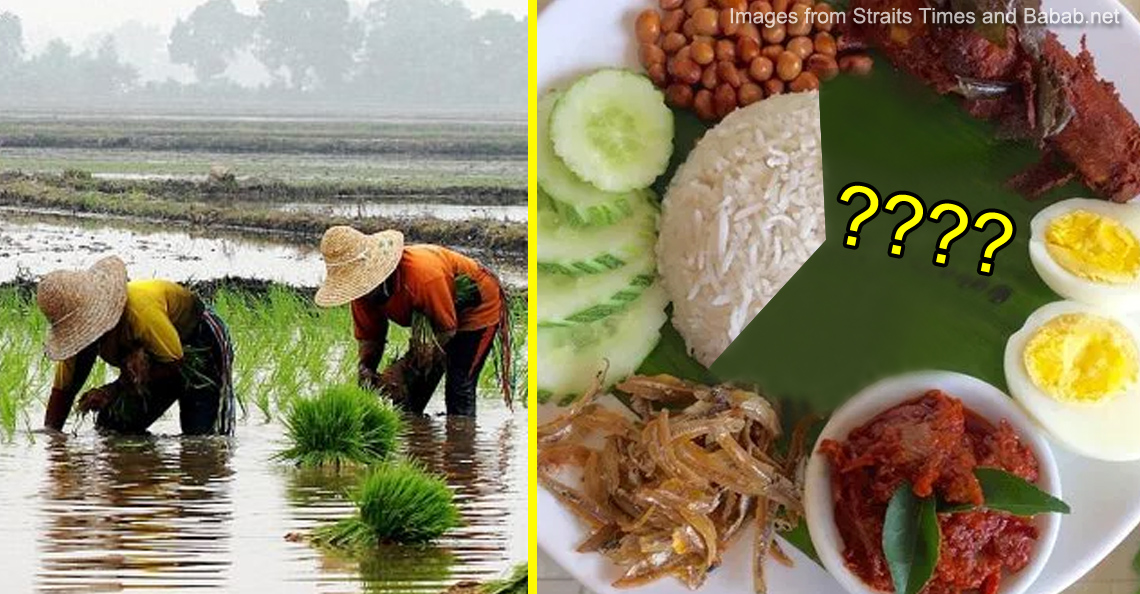
- 321Shares
- Facebook282
- Twitter6
- LinkedIn9
- Email9
- WhatsApp15
You’d probably remember what your parents would say whenever you don’t finish your rice. No, not the pimples growing on your future significant other’s faces but something about how some kids in another continent would starve. Now, imagine that happening to you but it’s not because there isn’t just enough food in general but because… farmers can’t plant rice on time?
As it turns out, paddy farmers in Kedah and Perlis might miss their usual paddy planting schedule this time of the year. Just recently, a group of paddy farmers under an NGO called the Malaysian Paddy Farmers Association (PeSAWAH) sent a memorandum to the govt to voice their issues on this.
Waitamin. Does that mean we’re not gonna have rice on our plates? Well, before we get to that answer, we found out that…
This is not the first time farmers had missed the schedule
Planting schedules are set by agencies under the Ministry of Agriculture and Food Industries such as Muda Agricultural Development Authority (MADA) and Kemubu Agricultural Development Authority (KADA). And within a year, the agencies set two schedules for two rice planting seasons.
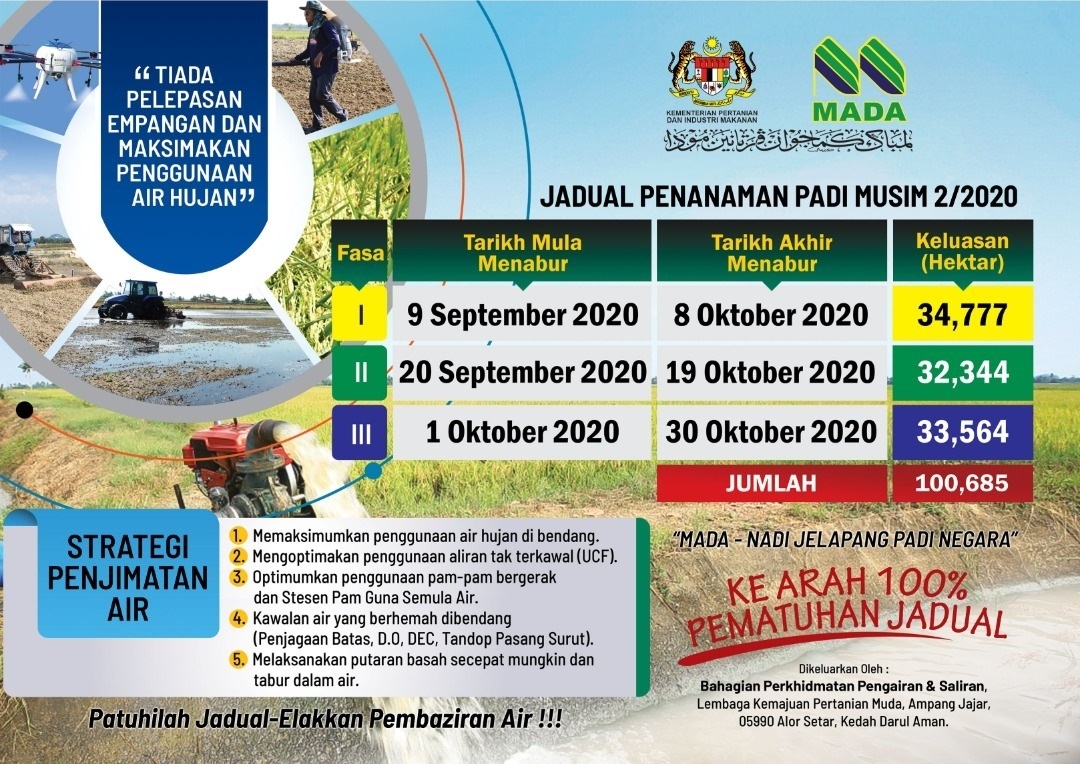
See, the schedule is important because the process of growing rice could take up to 6 months before it can be harvested. Normally, farmers would place their orders between three and six months before they start planting to give time for suppliers to produce the seeds.
And while waiting for the seeds, farmers would prepare the field to plant the seeds. They would flood, plough, puddle and level the field before transplanting the seeds in the field. You can watch the video below to get a clearer picture of how planting paddy works.
In addition, the planting schedule depends on the weather forecast such as when it rains to collect water in water catchment centres or the monsoon season to prevent farmers from huge losses to big. Govt agencies like MADA and KADA always remind farmers to follow the schedule mainly to prevent water wastage because the irrigation system continuously supply water to fields even though there isn’t any seeds planted.
“Farmers are always reminded to follow the schedule set because it is made based on the water supplied from the water catchment centres.” – Abdul Rashid to Malaysiakini, translated from BM.
But there have been several times where farmers had actually missed the schedule. Back in 2012, farmers missed on the planting schedule because they needed to dry out the paddy fields before planting new seeds. And, in the first season in 2019, farmers had to delay planting rice due to weather conditions.
In both aforementioned examples, farmers were sorta advised to delay rice planting. However, in 2020, most farmers just had no choice but to delay the planting schedule.
According to PeSAWAH’s Exco, Abdul Rashid Yob, some farmers claimed that the seeds sold to them by suppliers were hella expensive and majority of them claimed that the seeds were OUTTA stock.
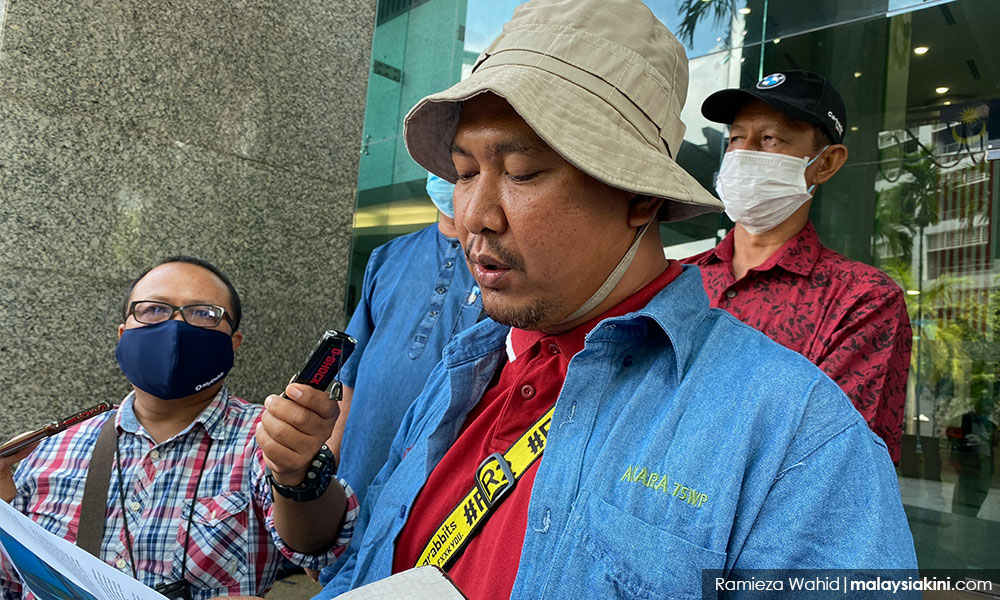
“But the majority of farmers in the first and second phase can’t start planting because the seeds that they want are not in stock.” – Abdul Rashid to Malaysiakini, translated from BM.
He also added that the some farmers were charged a maximum of RM60 instead of the usual RM28 per kg. As if that’s not enough, they were also supplied with low quality seeds. If you’re into planting anything, you might know that planting bad seeds would only slow the growth of the plant. And the same can be said about paddy seeds.
And this problem isn’t really new considering how PeSAWAH sent a similar memorandum in 2019… tho the govt didn’t do anything about it. Abdul Rashid assumed that it may be because of the backdoor govt drama the govt changed sometime earlier this year.
But we found that the problem farmers have with the suppliers may have started in 2012 when…
The govt approved a RM165 million tender to companies with NO experience in supplying rice seeds
While researching for this story, we were super curious as to which companies are responsible for supplying rice seeds to farmers. And a quick search brought us to a list of these suppliers, according to a study done by Khazanah Research Institute (KRI).
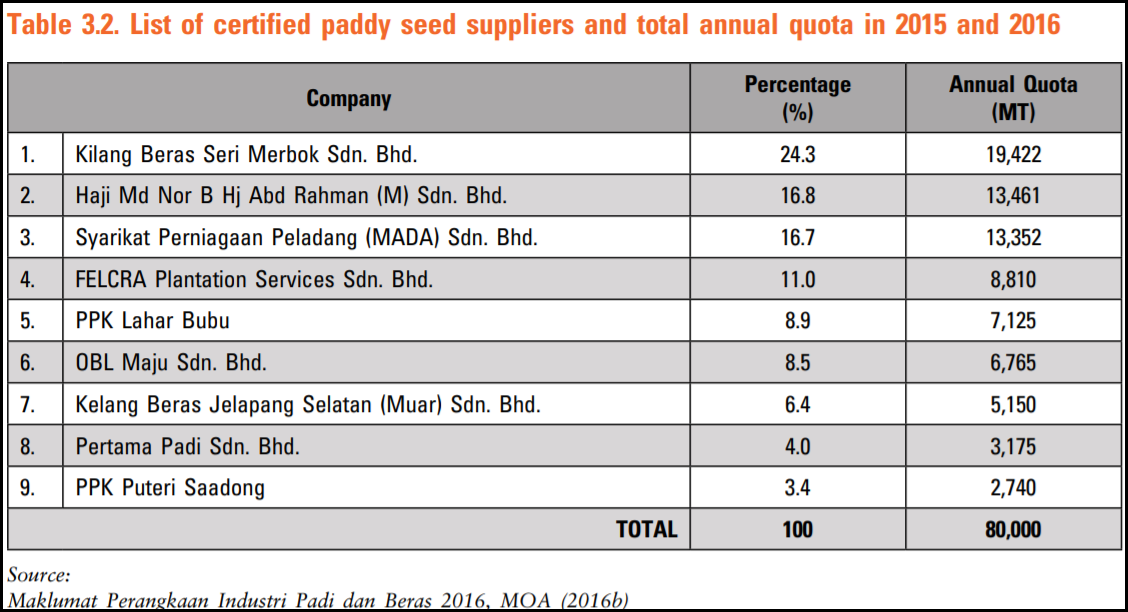
So back in 2012, some of the companies listed in the image above were under fire for being awarded with tender to supply paddy seeds to farmers for two years (2013 to 2014). The Finance Ministry awarded the RM165 million tender to various companies tho… they were deemed unqualified for the job in the first place.
See, the whole process of approving the tender was quite dodgy to begin with. The tender was approved despite some documents being incomplete, while a few of the companies seeking the tender weren’t even able to meet criteria such as attending the necessary briefings. Some of them even failed a financial evaluation.
And although they passed the technical evaluation criteria, the technical evaluation committee weren’t too keen on these tenderers because they have ZERO experience in producing paddy seeds under the Agriculture Ministry.

And some of these companies didn’t even try to hide this fact. The then manager of Haji Md Nor bin Haji Abd Rahmah (M) Sdn Bhd (HMN), Mansor Md Nor admitted that his and other companies awarded with the tender did not meet the tender criteria. And all he had to say was…
“This is not an issue.” – as quoted by Malaysiakini.
To Mansor, it’s not really an issue because, at least, his company managed to help farmers fix their fields according to the criteria set by the authorities. And he may be right considering how these companies are still the supplier of rice seeds now.
But the incompetence of these companies may not be the only concern farmers have. This is because they are also suspecting that there is an abuse of power by some parties who purposely charge farmers extra money for a kilogramme of rice seeds.
“Coupled with our assumption that there is an abuse of power by the authorities who take a commission on the approved seeds. Seed producers annually demand a subsidy of RM20 for each bag of 20kg of seeds.” – Abdul Rashid, as quoted by Malaysiakini. Translated from BM.
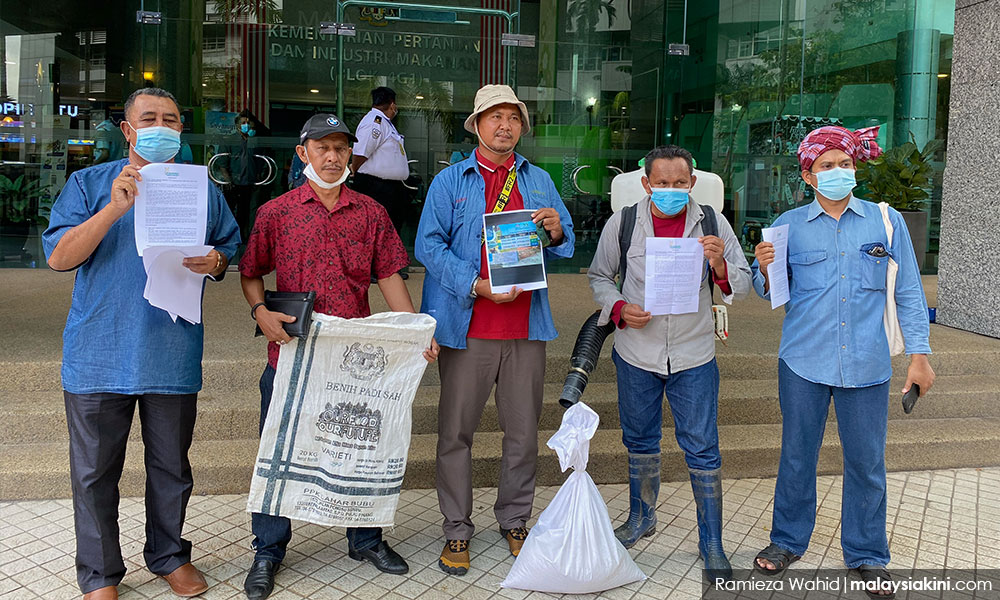
And there might also be a possibility that the suppliers might be supplying farmers with non-certified seeds, which may explain why they’re low quality. Although it’s not illegal to sell these seeds, farmers who buy them won’t be entitled for the farmers subsidies la. In addition, the seeds are incomparable to the cheaper, subsidised certified seeds which are of higher quality.
This may be why MADA had urged its farmers to always purchase certified seeds that are sold by the three main suppliers in Kedah and Perlis which are the Syarikat Perniagaan Peladang MADA Sdn. Bhd. (MADACorp.), Pertama Padi Sdn. Bhd. and KB Seri Merbok Sdn. Bhd.
But with the current situation where the rice plantation would be delayed, does that mean we’re not gonna have rice on our plates soon?
We’ll still have rice on our plates in the near future thanks to MADA. Kinda.
Just in case you don’t know, 70% of rice that we consume are grown locally in paddy fields under MADA and KADA which are located in locations below:
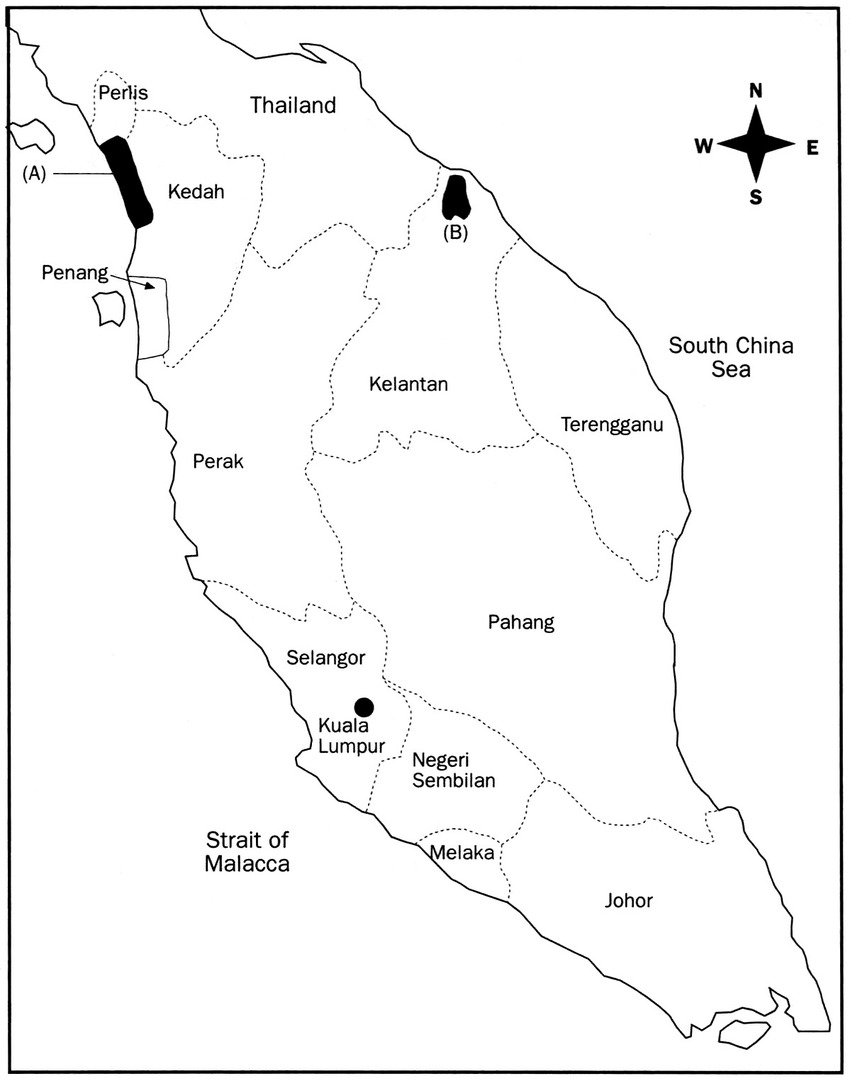
By now, you’re probably wondering if you’d be able to get enough rice in the near future considering the problem faced by the farmers now. Well, fret not. You will and we might have MADA to thank la. Sorta.
We say sorta because MADA claimed that there’s enough seeds for the farmers after all(?). In fact, they claimed that the seeds are MORE than enough.
“Based on the presentation by the three producers, it was found that the total production of Certified Seeds is expected to be sufficient at 14,517 metric tonnes, exceeding the requirement for use in the Muda Area of 14,096 metric tonnes.” – MADA, in a statement to Harakah Daily. Translated from BM.
MADA also urged the Agriculture Ministry to take firm actions against those who manipulate the price of rice seeds.
Besides MADA, the farmers had given also out several suggestions to prevent the same thing from happening again like…
- Introducing price ceiling for rice seeds
- Allowing farmers to keep some of the seeds they harvest so they don’t have to always rely on suppliers
- Give license to Local Farmers Organisations (PPK) to supply rice seeds to farmers
However, at the time of writing, there is no further news on the govt’s response to the farmers memorandum. So, until the govt does something about this problem, it seems as though the farmers might be stuck in an endless cycle of buying low-graded seeds at a high price, that might eventually affect their rice bowls in the future.
- 321Shares
- Facebook282
- Twitter6
- LinkedIn9
- Email9
- WhatsApp15


